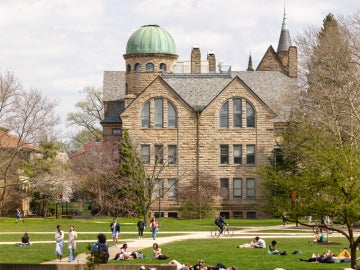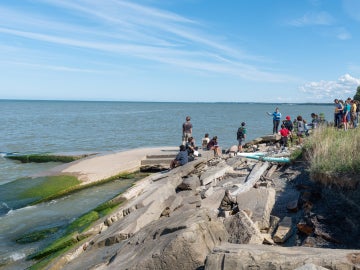Nine International Obies Will Begin PhDs in STEM
June 4, 2020
Jaimie Yue '22

The liberal arts approach is gaining traction among prospective STEM students overseas.
Photo credit: Mike Crupi
Roughly a third of all Chinese international students in the Class of 2020 have secured positions in top PhD programs. They credit the liberal arts approach to STEM and the support they've received from Oberlin’s faculty, programs, and academic services.
Nine Chinese international students in the Class of 2020 will begin fully funded and stipended PhD programs in STEM in the fall. Despite the limitations that international students face due to their citizenship, the nine students, roughly a third of all Chinese international students in the Class of 2020, still managed to secure positions in top PhD programs because of support from Oberlin’s faculty, programs, and academic services.
The nine students are Charles Cui, Yiling Fang, Keyi Feng, Tao Hong, Jiachen Liu, He Ren, Qia Wang, Yuhao Wu, and Yichi Zhang.
Despite arguments in favor of attending large research universities, the liberal arts approach is gaining traction among prospective STEM majors, even overseas.

Photo courtesy of Yiling Fang
Yiling Fang is a biology major and chemistry minor originally from Nanjing, China, and will be starting her PhD in plant and microbial biology at the University of California, Berkeley. She explains that China has several liberal arts college fairs, and she first learned about Oberlin at a fair in Shanghai.
Out of all the schools there, she was most drawn to the admissions officer from Oberlin because of her enthusiasm and passion about the school: “There weren’t any admission officers that were like her,” she says.
Charles Cui, who double-majored in math and computer science, will be pursuing a PhD in computer science at Northwestern University. “The mentorship between my professors and peers are the most valuable things I received” while at Oberlin,” says Cui.

Photo courtesy of Charles Cui
Fang notes how Oberlin’s approach to learning in STEM has greater emphasis on communicating scientific ideas rather than simply textbook knowledge.
“Oberlin’s STEM program is not just about the knowledge you learn, it’s about trying to give [students] practice on scientific critical thinking. Most of the biology classes I took had more emphasis on group work and how to communicate science with the public, which I think might not be as emphasized [at] other colleges or universities. In one of my immunology classes, I got the chance to make videos [for the first time] to communicate immunology to the public, and I really liked it.”

Photo courtesy of Leo Wu
Leo Wu, a chemistry major originally from Zhengzhou, will be starting a PhD program in chemistry at Northwestern University this fall. Outside of classes, he describes how his experience as an Oberlin Workshop and Learning Sessions (OWLS) leader and coordinator for chemistry reflected Oberlin’s dedication toward peer learning, especially in STEM subjects.
“A community around peers is really important because you learn from each other and you want to have someone around you who is also motivated, self-driven, and passionate about your field,” Wu says.
Oberlin’s size and liberal arts approach is ideal for undergraduate research, says Assistant Professor of Computer Science Sam Taggart, Cui’s advisor.
“Smaller liberal arts schools perfectly package the three things you need to get off the ground as a researcher: technical proficiency, which at Oberlin is cultivated in small classes with skilled instructors; dedicated mentorship, a passion of everyone here; and connection to a broader research community, which should be clear from the quality of scholarship the faculty produce,” says
Taggart directly inspired Cui to pursue a PhD in computer science, specifically with a concentration in the intersection of theoretical computer science, economics, and law.
Due to his status as an international student, Cui’s citizenship made him ineligible for the majority of Research Experiences for Undergraduates (REUs) funded by the National Science Foundation (NSF). With limited options, he turned to Taggart, who invited Cui to work on a summer research project on the intersection of game theory in economics and privacy after Cui’s second year.
“That summer, I learned a lot,” Cui said. “Professor Taggart met with us almost daily during the week. We presented our results and asked questions; Sam has always made himself available. He’s very approachable, gives great advice, and is very supportive and encouraging. And he has been that way for my honors project as well. After that summer of research, I also took three upper-level computer science classes with him.”
For Wu, working with Associate Professor of Chemistry and Biochemistry Catherine Oertel was what helped him decide on his career path.
“In my own experience, I really struggled to determine my major in my sophomore year, and I think doing research in Professor Oertel’s lab really helped me clear my mind about what my future would look like if I pursued chemistry, and I just really appreciate the chance to get research experience this early,” Wu added.
Taggart believes that Oberlin’s smaller size and emphasis on the undergraduate student is what enables successful mentor-student experiences and helps students who plan to pursue postgraduate studies.
“One-on-one research mentorship is exciting because, at its best, research is a process of shared struggle,” Taggart wrote. “It's about asking a question nobody has known to ask or known how to answer. It is also a chance to help students develop the sometimes-neglected skill of working out of confusion into understanding. Students often get to graduate school without realizing the importance of these questions. I love being able to give my students a head start, one that is only possible with the sort of close mentorship that happens at Oberlin.”
Cui appreciates how the computer science department supported him in helping him to decide on graduate school. In addition, Jack Calcut and Ben Linowitz in the math department wrote recommendation letters, and Writing Center and Writing Associate Momo Suzuki advised many of his academic papers.
“The computer science department held a lot of lunches or talks telling people about different options after graduation, so that’s how I learned about grad school originally,” Cui said. “ I got the most help from Sam Taggart, my advisor, because applying to PhD programs is different from applying to college. Your personal statement is more of a research statement— so my professor knows what grad school expects and what they want to see in a statement.”
Fang was likewise inspired by Professor of Biology Marta Laskowski. Both Laskowski and the Career Development Center provided specific guidance and advice for her resume, CV, and application materials for her summer internship at the Arnold Arboretum in Boston and later graduate school.
Fang had the opportunity to travel with Laskowski to the Netherlands for a summer, working in the lab that Laskowski to prepare materials to bring back to Ohio.
Fang noted, “This kind of experience can only happen in small liberal arts colleges because in big universities they will of course take postdocs and graduate students with them to do foreign collaboration meetings.”
“[The trip] was a really wonderful experience,” Fang added. “That was the first time for me to see [how] a research lab in a big university works and the difference between the European science field and the American science field.”
Similarly, Oertel gave Wu the opportunity to work at Cornell University for a summer, using the lab’s instruments to characterize inorganic compounds and observe graduate students at work.
“That was a memorable experience for me because at Cornell, at that time, research was still a very fresh thing for me, but at Cornell, I was able to see some grad students who were very involved in their research subjects,” Wu said.
Deciding on, applying to, and being accepted to graduate school is no easy feat, and requires careful deliberation, persistence, and hard work. However, the students agree that the support from their professors, advisors, and even classmates at Oberlin has helped them immensely.
“If I can give a piece of advice to Oberlin students who want to major in STEM: I would say go to office hours. Go to talks. Get to know your professors and let them get to know you. Build close relationships with these people. They want to help you. And if you’re humble you will learn a lot,” Cui said.
“I'm super proud of this year's graduates,” Taggart wrote. “They were a pleasure to teach and work with. I look forward to seeing what they do with the next stage of their lives.”
You may also like…
Oberlin Launches Critical AI Studies Minor in Fall 2026
With a solid foundation in both science and the humanities, this minor ensures students to understand and be able to analyze the ethical, cultural, environmental, political, economic, technological, and labor effects of AI.
Research Roundup
Every day, Oberlin’s faculty and students produce scholarly work that uncovers new insights into how we understand the world, particularly in the areas of sustainability and the environment.
How Virtual Chemistry Can Provide Real-World Solutions
Assistant Professor of Chemistry and Biochemistry Professor Shuming Chen’s NSF CAREER award funds research and education opportunities for Oberlin students.


